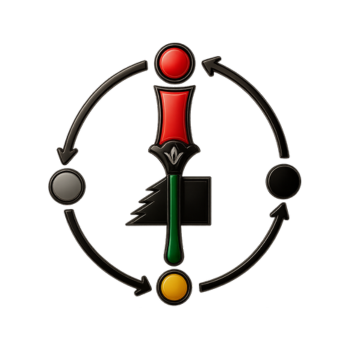-
The concept of Afrikan rationality has been distorted, obscured and discarded by centuries of epistemic violence produced by colonial and neocolonial scholarship. Through their lens, the Afrikan mind has been defined in binary terms as the opposite not only of the Western mind but also of the mind of the rest of humankind. According to their philosophies, the Afrikan mind is irrational, emotional and superstitious and by nature antithetical to philosophical and scientific rationality. But as postcolonial scholarship has shown, Afrikan epistemology is far from this. For thousands of years Afrikans have domesticated cattle, developed agriculture, created astronomical calendars, mastered medicinal plants, educated their children and survived various mortal dangers because they gained an efficient knowledge that opened the secrets of nature and unlocked the “enigma” of human existence which is still visible today to bear witness to Afrikans passion for genuine knowledge. Afrikan languages indicate that Afrikans have used the power of reason to carefully analyze nature and the human condition in the world.
For example the Shona language is said to have more than 200 different words to describe the action of walking. The adjective “big” is said rendered by 183 words in the Nupe language and 311 words in Hausa. Many languages have 10 or 20 words to describe an object according to changes in its form, weight, volume or color and as many words to characterise an action depending on whether it is single or multiple, weak or strong, beginning or ending. This Afrikan epistemology is based on careful observation of natural phenomena and a logical explanation of reality. The very purpose of knwledge is to ensure a good life for oneself and the community. This notion of critical thinking for example is expressed in the “Bwino” epistemology of the Baluba and is grounded in the proverb ” Mwana wihangula, ye unvwaa”, meaning “the child who raises questions is the one who will gain knowledge,” which stipulates the centrality of the question in the path toward knowledge. For the Bantu, knowledge does not stem from a blind repetition of ancestral ways.
The Baluba state that in order to know, one has to begin with the “art of knowing,” being carefully aware that everything that shines may not be a “genuine knowledge” (Bwino ke bwino). This means that knowledge is not knowledge until it is critically examined and its validity enshrined. It is precisely this power of critical thinking that has made Afrikan tradition dynamic, vibrant as well as flexible, constantly adapting to new challenges. The very survival of Afrikan people throughout history is due to this kind of epistemology, which allowed people to assess the meaning of new realities, in the light of old canons and to assess ancestral wisdom and customs in the light of new circumstances and wisdom.
5 Comments-
Wonderful!!
-
Much love always Prentice…thank you. Hope all is well and continue to have a postive and uplifting week.
-
-
Facts of life. Knowledge and insight.
-
“This Afrikan epistemology is based on careful observation of natural phenomena and a logical explanation of reality. The very purpose of knwledge is to ensure a good life for oneself and the community.” -Love it!!
I appreciate this whole offering. We need not to prove anything to yurugu- but, it’s very inspiring to learn about the depth of CONNECTION our People have to Universal truths.-
I wholeheartedly agree with you and well said Goddess. Afrikans theory of knowledge or better still Afrikan epistemology deals with the very faculties by which we gain knowledge and the debate over the credibility of such means, it addresses the critical issues of truth. Epistemology arrived to challenge as well to decolonise the critique of Western and Westernised epistemologies which constitutes an important part of Afrikan epistemology. There are actual stages that epistemology operates but I will explain in another post. Much love for reading.
-
-

